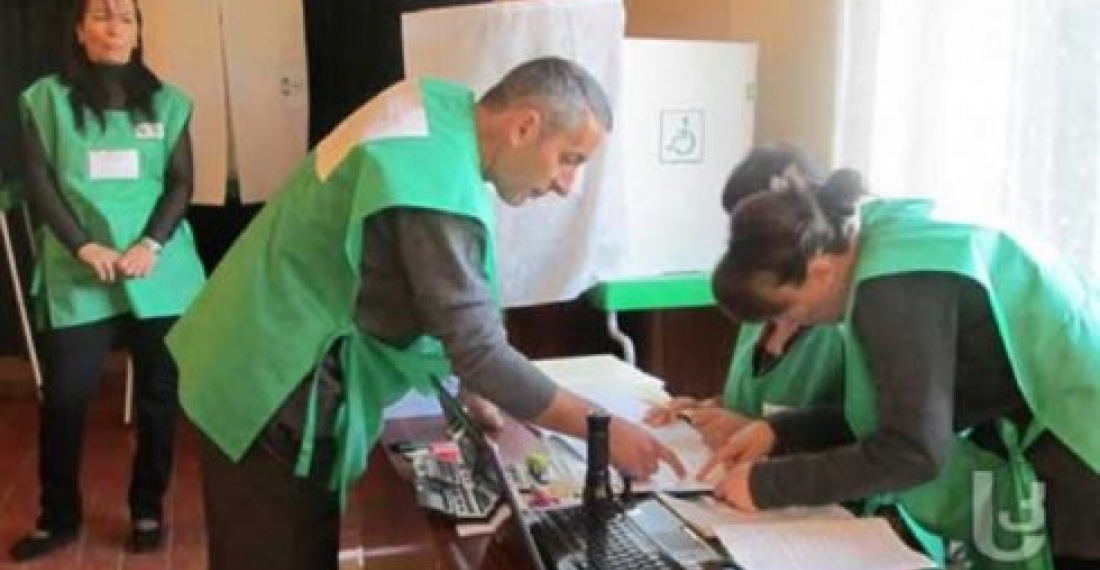Felix Light reports from Tbilisi for commonspace.eu ahead of parliamentary elections on Saturday
There is no mistaking election season in Georgia.
Across the country, political billboards, posters and signs are everywhere. In the streets, rallies are commonplace, whilst on Georgia's 23 TV channels, discussion, occasionally heated, of the election planned for October 8th is inescapable. On the surface, at least, democracy is alive and well in what, in 2012, became only the first post-Soviet country outside the Baltics to complete a peaceful, electoral transfer of power.
And yet, a noisy and garish campaign is perhaps not the best indicator of the health of Georgia's young democracy. The successful practice of democracy requires a whole host of actors performing obscure, unglamorous work, and it is these actors and their work from which Georgia's democracy draws its strength.
First among them is the Central Election Commission (CEC), the body tasked with ultimate authority over Georgia's electoral process. Notwithstanding any other factors, the task of the CEC would be a critical one in any case. Georgia's electoral system is not simple: of the 150 member parliament, 77 are elected proportionally, from the candidate lists of those parties that receive 5% or more of the nationwide popular vote. The remaining 73 are then elected by a majority vote in single-member constituencies, in races that later proceed to a run-off between the top two candidates should no candidate achieve an outright majority. In short, Georgian elections rely on a byzantine blend of electoral systems that would likely be administratively challenging in any democracy.
It is fortunate, then, that the indicators would suggest that the CEC's work deserves praise for its diligence and robustness. A September report, issued by the OSCE's Election Observation Mission to Georgia expressed 'confidence in the CEC's professionalism and performance'. The CEC, noted the Mission, had successfully advocated for, and secured, a series of significant reforms to Georgian electoral law in June this year, including easing certain restrictions on voter registration.
On the ground in Georgia, a recent interview with Tamar Zhvania, chairperson of the CEC, painted a picture of a peaceful and consensual environment in which preparations for the election had been conducted. No complaints, Ms. Zhvania noted, had been lodged by any of the political parties regarding the composition of the electoral register, a potentially difficult issue in a country accommodating over 200, 000 Internally Displaced Persons, and with a history of electoral roll irregularities.
This election will also see the almost complete elimination of voting in closed military establishments and penitentiary facilities - in the past considered fertile ground for electoral abuse by incumbent authorities.
Georgian politics is an often brutal, partisan affair, and the CEC has attempted, with mixed results, to remain aloof from the fray. Among the Commission's most important roles is overseeing the registration process for political parties, which saw it this year refuse legal status to eighteen would-be parties. Most prominent among the declined parties were the Centrists, led by Temur Khachishvili, a controversial former interior minister with a history of involvement in paramilitary activity. The pro-Russian party's incendiary television ads, which promised larger, Russian-style pensions and proposal to 'legalise' Russian military bases in Georgia, led to speculation of a politically-motivated de-registration, an accusation dismissed by Ms. Zhvania, who assured us, when commonspace.eu interviewed her over the summer, that 'it doesn't matter whether a party is pro-Russian, pro-American, or pro-European'. The Centrists, like seventeen other parties, simply failed to meet the legal requirements of registration, and were declined.
Since last year, the CEC has also been embroiled in a partisan brawl surrounding the issue of redrawn constituency boundaries. In 2015 the CEC was tasked with redrawing 30 such constituencies, a mandate challenged by opposition lawmakers, in a case heard, and ultimately thrown out by, the Constitutional Court, that alleged the potential for gerrymandering by the CEC. In December, when the initial boundary changes bill was approved, Zurab Abashidze, an MP for the opposition Free Democrats, called it 'disastrous', and United National Movement (UNM) lawmakers slammed it as a naked attempt to manipulate the 2016 elections.
On the CEC sit representatives of each of the seven large political parties in Georgia, and Tamar Zhvania has had to resort to all her diplomatic skills in order to ensure that the Commission remains as united as possible whilst navigating Georgia's turbulent political waters.
Nevertheless, inter-party relations remain perhaps the most vexed issue confronting both the CEC, and Georgian democracy itself. Since May, there have been several serious, even if isolated, incidents of political violence, that set off alarm bells among local NGOs, with Transparency International Georgia issuing a statement warning of their 'jeopardizing [a] free and fair pre-election environment'. The bombing of the car of an opposition MP in central Tbilisi four days before the elections is a still more ominous development, suggesting that there are still those in Georgia who seek power through bombs rather than ballots.
Overall, however, the odd eruption of violence aside, Georgia's democratic infrastructure is remarkably solid. On Saturday it will be put to the ultimate test, ensuring one hopes, not only that the will of the Georgian people expressed through the ballot box will be reflected in the election results, but also showcasing a new level of political maturity among politicians and electorate alike.
source: Felix Light filed in this report from Tbilisi for commonspace.eu
photo: Staff of the Central Elections Commission of Georgia, in their distinctive green uniforms, check documents at a polling station (archive picture).







